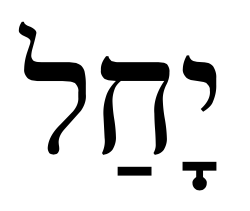a study of hope
I've had the first word below written on my arm all week. I've written it on the outside of my door. I've spoken of it in chapel and in conversation. I've searched for it as I read the Bible. I've pondered and prayed it. When I asked one of the girls in the dorm what I should write my blog post about tonight, she said, "Yachal!"
First, a bit of technical but incredibly meaningful jargon. But keep reading for the beautiful stuff.
Yachal is the Hebrew word meaning, briefly, "to wait, to hope." And I think there is so much beauty in the fact that Hebrew combines those concepts as one. Waiting and hoping. In some of my further study of the idea of "hope," I've discovered that yachal is not alone in its depth of meaning.
As I looked into the deeper meaning of yachal, still in awe of the connection between "wait" and "hope," I found that another form of the word "hope" in Hebrew is batach, which not only means "to hope," but also "to trust." That really surprised me; we think of trust and hope as two very separate ideas, separate emotions, separate mental processes. "Trust" and "hope" have been the two biggest ideas that I have been wrestling through this semester. There is something so profound in the fact that the language of the Old Testament, the language in which God first revealed Himself, those two concepts are nearly one in the same.
And not just the Old Testament. In New Testament Koine Greek, there is really only one commonly used word for hope, elpizo, and it also encapsulates "trust" and "hope" into one word.
I've included the definitions of some of these incredible words.
 |
| yachal - to remain, to delay, to expect, to hope, to wait (for) |
 |
| batach - to trust, to hope in, to confide in, to set one’s hope and confidence upon anyone, to be secure, to fear nothing for oneself |
 |
| qavah - to bind, to be strong, robust, to expect, to await, to be gathered together |
 |
| sabar - to look at, to view, to expect, wait for, to hope |
 |
| elpizo - to hope, to hopefully trust in, to wait for salvation with joy and full of confidence, to trust in |
You can see them for yourself here; explore the verses in which they are used!
To wait is to trust.
To trust is to hope.
To hope is to believe there is something worth waiting for.
I put this into practice yesterday. I needed to do some processing of some hard memories from around the accident, but I didn't want to because it was late; everyone was either gone for reading break or sleeping already. I wondered why I felt like I needed people around in order to do this. I realized that I didn't actually think I could trust God to be as much of a comforter as another human could be. But everything I say I believe about God preaches the opposite - I believe, even if I doubt, that God is the ultimate comforter, the best comforter, the most present comforter. At least, I hoped so. I hoped he would come through, hoped he would show up, but the only way to find out would be to actually trust him. And the only way to actually trust him would be to put myself in the situation where he has to come through. It was a scary thought. I waited a long time before I was ready. Then I dove in; I journaled and cried, and felt like I was literally in the arms of Jesus, my head on his chest as we cried together. It wasn't until I opened my eyes at one point that I realized that he wasn't physically there next to me. If someone had seen me in the room, it would have looked like I was alone, but I wasn't. I had decided to hope in him, to wait for him, to expect him, to trust him just a little bit more. And with each fulfilled hope, each tiny step forward, I trust him more.
We must hope. We must wait, we must trust that there is something worth waiting for.
But we are not the only ones who hope.
Earlier this week, broken by the stories of people whose lives have contained so, so much hurt, I sat and asked God, Why don't you come back already? Why haven't you ended this yet? And I realized in a moment, in one breath, that God must love us so much because he continues to allow suffering that he hates in order to allow more time for more people to be saved. The people who are yet unsaved, he knows them and he wants them. Even the people who are yet unborn, he knows them and he wants them. He hates, hates, hates the evil and distress that is hurting his children. He hates it. But he is waiting. Waiting. Waiting and hoping. God is the author of hope because he hopes more than any of us. He is the Great Hoper, the One of Great Hope. He longs for, expects, gathers together, waits.
To wait is to trust.
To trust is to hope.
To hope is to believe there is something worth waiting for.
He believes we are worth waiting for.
I believe he is worth waiting for. He is worth trusting. He is worth hoping in.
Jesus is my hope, my trust, my everything. He will be yours too.



Comments
Post a Comment
thoughts so far